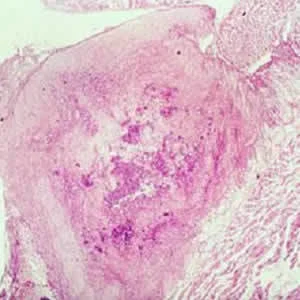According to a study published in JAMA, among patients undergoing transcatheter aortic valve replacement, younger age, male sex, history of diabetes mellitus, and moderate to severe residual aortic regurgitation were significantly associated with an increased risk of infective endocarditis. In addition, patients who developed endocarditis had high rates of in-hospital mortality and 2-year mortality.
Approximately 1 to 6 percent of patients are affected by infective endocarditis following surgical valve replacement. It is associated with both a risk of illness and death. Transcatheter
aortic valve replacement (TAVR) is a therapeutic tool that is used in patients with acute stenosis and are considered to be high-risk.
To date, limited data exists on risk factors and clinical outcomes of patients who develop infective endocarditis after TAVR. A team of researchers led by Josep Rodes-Cabau, MD, of Quebec Heart and Lung Institute, Laval University, Quebec City, Quebec, Canada analysed data from the Infectious Endocarditis after TAVR International Registry. Patients from 47 centres across Europe, North America and South America with definite infective endocarditis after TAVR were included in the analysis.
250 cases of infective endocarditis occurred in 20,006 patients after TAVR and the median time from TAVR to endocarditis was 5.3 months. Findings showed that younger males (78.9 years vs. 81.8 years) with diabetes mellitus (42 percent vs. 30 percent) and moderate to severe aortic regurgitation (22 percent vs 15 percent) were more likely to develop it. 53 percent of the patients developed health care-associated endocarditis. In-hospital mortality rate was around 36 percent and this was found to be associated with heart failure and kidney injury. 2-year mortality rate was found to be 67 percent.
“The rate of infective endocarditis after TAVR observed in the present study is similar to that reported for surgical prosthetic valve endocarditis, therefore, supports the lack of reduction in the rate of prosthetic valve infective endocarditis after TAVR despite less invasive nature of TAVR compared with surgical valve replacement, the authors write.
Source: JAMA
Image Credit: Wikimedia Commons
To date, limited data exists on risk factors and clinical outcomes of patients who develop infective endocarditis after TAVR. A team of researchers led by Josep Rodes-Cabau, MD, of Quebec Heart and Lung Institute, Laval University, Quebec City, Quebec, Canada analysed data from the Infectious Endocarditis after TAVR International Registry. Patients from 47 centres across Europe, North America and South America with definite infective endocarditis after TAVR were included in the analysis.
250 cases of infective endocarditis occurred in 20,006 patients after TAVR and the median time from TAVR to endocarditis was 5.3 months. Findings showed that younger males (78.9 years vs. 81.8 years) with diabetes mellitus (42 percent vs. 30 percent) and moderate to severe aortic regurgitation (22 percent vs 15 percent) were more likely to develop it. 53 percent of the patients developed health care-associated endocarditis. In-hospital mortality rate was around 36 percent and this was found to be associated with heart failure and kidney injury. 2-year mortality rate was found to be 67 percent.
“The rate of infective endocarditis after TAVR observed in the present study is similar to that reported for surgical prosthetic valve endocarditis, therefore, supports the lack of reduction in the rate of prosthetic valve infective endocarditis after TAVR despite less invasive nature of TAVR compared with surgical valve replacement, the authors write.
Source: JAMA
Image Credit: Wikimedia Commons
Latest Articles
Infective Endocarditis, TAVR
According to a study, among patients undergoing TAVR, younger age, male sex, history of diabetes mellitus, and moderate to severe residual aortic regurgitation were associated with an increased risk of infective endocarditis, and patients who developed en










